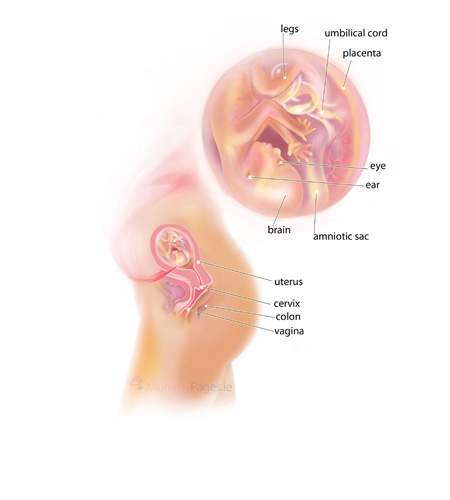It’s week 16 and about time for your second prenatal visit. Your baby continues to grow at a rapid pace and so does your tummy. You may want to pay close attention to what you are feeling this week. For many women, week 16 is the time that they will first feel their baby move!

Your Baby This Week

At week 16, your baby is now around the size of an avocado, or about 11.5cm (4.5 inches) and weighs in around 100 grammes (3.5oz). This is an incredible amount of growth for such a short period of time!
Your baby’s genitals are now visible on ultrasound, so if you were to have an ultrasound at this stage you would definitely know the gender. Your baby's facial features are now becoming even more defined as eyebrows, eyelashes, and hair start to come in. His taste buds are also more defined now. In fact, some studies suggest that a baby this young can actually taste the amniotic fluid which will take on flavours of the mum’s diet.
Your baby has all ten fingernails and all ten toenails at this point. They are also growing. In fact, it is very common for a baby to be born with long fingernails and toenails that have to be trimmed right away. Your baby’s bladder is also functioning now on a regular basis, filling and emptying about every 40 to 45 minutes.
An interesting development of week 16 is happening in the ears. In order for your baby to hear, there are three tiny bones that must develop inside the ear. Additionally, the part of the brain that controls auditory function must be developed. Although your baby at 15 weeks is developing the ear bones, the brain function will not kick in for a while yet.
Although some experts believe that a muffled type of hearing starts at this early stage, it is when the auditory brain functions begin that the hearing changes and becomes more like what we understand hearing to be. Nevertheless, if you ask several experienced mums, they will tell you that they have felt their baby’s jump in reaction to a loud sound around this time.
Your Body This Week

A long anticipated event in your pregnancy is feeling your baby move for the first time. Now that you are 16 weeks pregnant and your baby is large enough that his movements can be felt, you are finally at the point where it can happen. Sometimes, mums don’t feel the movement until they are closer to 20 weeks of pregnancy. This is common for first pregnancies. Many times, a woman might think they are having gas or just intestinal movements when it is the baby moving. Experienced mums are likely to detect the movements early on and can discern them from gas or intestinal movement. These first movements are sometimes called ‘quickening’. They are also known as bubbles, butterflies, and flutters.
A test that you may be offered at this time is called an amniocentesis. This is a test that can detect chromosomal problems or genetic birth defects in babies, such as Down’s Syndrome or Spina Bifida. Although it is not a normal part of regularly scheduled prenatal visits, it is sometimes required to determine the best delivery date in case of a c-section birth. It is also indicated when there are any complications with the baby or with the amniotic fluid. The test does carry with it some small risk of miscarriage and other complications, so make sure that you understand why you need the test and what the risks are. The test is carried out by passing a thin needle through the uterus to remove a small amount of amniotic fluid that will be put through a number of tests. It sounds like a painful test, but is actually not that bad.









